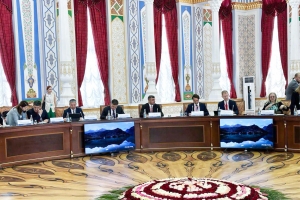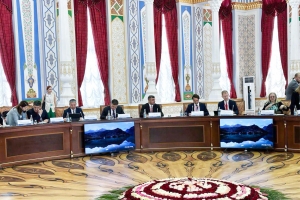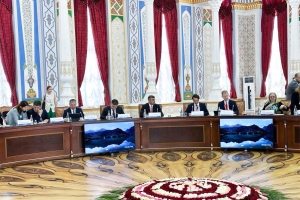Super User
Tesla Shares Soar as Q2 Deliveries Exceed Estimates
Tesla reported the second-quarter electric vehicle (EV) delivery number better than analysts' estimates but saw the second consecutive yearly decline, partly blamed on the closure of a German plant, Caspian Energy Media reports with reference to “euronews.az”.
Tesla's shares soared by 10% on Tuesday amid better-than-expected car deliveries in the second quarter, despite a second consecutive year-on-year decline. Although weakened demand and fierce competition contributed to the sales slowdown, Tesla's production of affordable cars and its energy storage segment may drive future growth.
Tesla delivered 443,956 EVs in the second quarter, surpassing the Wall Street average estimate of 439,302. However, the figure represents a 4.8% drop from the same quarter last year, following an 8.5% year-on-year decrease in the first quarter. The consecutive declines mark the longest losing streak in quarterly delivery numbers since 2012.
A film produced with the support of Azercosmos was presented
A presentation of the film "Preserving Our Precious Planet," produced with the support of Azercosmos, took place at the Tusi-Bohm Planetarium, located in the Park Bulvar Mall.
The presentation was attended by Samaddin Asadov, Chairman of the Board of Azercosmos; investor-entrepreneur Tahir Gozel; honorary guest, Türkiye's first astronaut and military pilot Alper Gezeravcı; and other guests, Caspian Energy Media reports with reference to Azercosmos.
Azərkosmosun dəstəyi ilə ərsəyə gəlmiş film təqdim olundu
Park Bulvar Ticarət Mərkəzində fəaliyyət göstərən Tusi-Bohm Planetariumunda Azərkosmosun dəstəyi ilə ərsəyə gəlmiş, “Dəyərli Planetimizi Qoruyaq” (Preserving Our Precious Planet) filminin təqdimatı baş tutub.
Caspian Energy Media Azərkosmosa istinadən xəbər verir ki, təqdimat mərasimində Azərkosmosun İdarə Heyətinin sədri Saməddin Əsədov, investor-sahibkar Tahir Gözəl, fəxri qonaq qismində Türkiyənin ilk astronavtı, hərbi pilot Alper Gezeravcı və digər qonaqlar iştirak ediblər.
Xatırladırıq ki, sözügedən film növbəti üç il ərzində Tusi-Bohm Planetariumunda nümayiş olunacaq.
Будет проведен CEO MeetUp Logistics & Trade
11 июля при совместной организации «Caspian Energy Club» и общественного объединения «Ассоциация транспортно-экспедиторских компаний Азербайджана» состоится CEO MeetUp Logistics &Trade. Об этом сообщил первый заместитель председателя и главный финансовый директор группы «Caspian Energy Club» Расим Махмудов.
В рамках мероприятия будут обсуждены такие темы, как экспорт (процедуры, география, ожидания), импорт, дистрибуция, опыт потребителей в работе с логистическими компаниями, а также транспортная экспедиция, менеджмент на складах, автоперевозки и актуальность страхования в логистике.
В обсуждениях примут участие руководители компаний, занимающихся экспортно-импортными операциями в агропромышленной, пищевой, строительной и других секторах экономики, а также руководители ведущих компаний, работающих в сфере логистики, складирования, таможенного оформления.
«Мероприятие станет полезной платформой для налаживания постоянного и эффективного диалога между производителем и потребителем в логистической службе, оптимизации и совершенствования сервиса в данном секторе экономики», - заявил Расим Махмудов.
По словам председателя Ассоциации транспортно-экспедиторских компаний Азербайджана Кямрана Габибова, на встрече соберутся специалисты всех уровней различных областей логистики, что, в первую очередь, создаст очень большую networking возможность. Также обсуждение путей решения существующих проблем, возникающих в процессе работы, обмен опытом и другие вопросы создадут условия для продуктивного проведения встречи.
Azerbaijan participates in IMF and World Bank Constituency Meeting
Chairman of Azerbaijan's Central Bank Taleh Kazimov participated in the Swiss Constituency Meeting held in Dushanbe, Tajikistan, Caspian Energy Media informs.
“Today, we had the opportunity to participate in the Swiss Constituency Meeting held in Dushanbe. During the speech, implementation of consistent reforms that will ensure long-term sustainable development and prosperity in the country was highlighted. In general, the event participants were informed about the main macroeconomic indicators of Azerbaijan and the development trends of the financial sector. Also, we once again emphasized the importance of Azerbaijan hosting such a globally important event as COP29 and the activities arising from it,” Kazimov said on X.
Azerbaijani rhythmic gymnasts ready for action in Zaragoza
Azerbaijani rhythmic gymnasts will demonstrate their skills at the international tournament set to take place in Zaragoza, Spain on July 5, Caspian Energy Media reports with reference to AZERTAC.
Azerbaijan is sending six gymnasts to join Group routine. The team of Azerbaijani gymnasts is comprised of Gullu Aghalarzade, Kamilla Aliyeva, Yelyzaveta Luzan, Laman Alimuradova, Zeynab Hummatova and Darya Sorokina.
CEO MeetUp Logistics & Trade to take place
Caspian Energy Club and the Freight Forwarders Association of Azerbaijan will be coorganizing CEO MeetUp Logistics &Trade on July 11. This was said by Caspian Energy Club First Deputy Chairman and CFO, Rasim Mahmudov.
Discussed at the event will be issues concerning export (procedures, geography, expectations), import, distribution, consumers’ experience in working with logistics companies, including freight forwarding, depot management, road transportation and the importance of insurance in the logistics industry.
Participating in the event will be heads of companies performing export-import operations in the agricultural, food, construction and other economic sectors, as well as officials of companies offering logistics, warehousing and customs registration services.
“The event will become a useful platform for establishing continuous and effective producer-consumer dialogue in the logistics sector, as well as for optimizing and improving the service level in this sector of the economy”, Rasim Mahmudov said.
Bringing together all level specialists from different sectors of logistics will provide a broad opportunity to network, according to the Head of the Freight Forwarders Association of Azerbaijan, Kamran Habibov. Besides, discussion of ways of addressing problems arising in the course of the work, and exchange of experience will make the meeting productive and fruitful.
Azərbaycan Dünya Bankı və IMF-nin Seçki Qrupunun toplantısında iştirak edib
Azərbaycan bu gün Tacikistanın paytaxtı Düşənbədə keçirilmiş Dünya Bankı və Beynəlxalq Valyuta Fondunun (IMF) Seçki Qrupunun toplantısında iştirak edib.
Caspian Energy Media xəbər verir ki, bunu Azərbaycan Mərkəzi Bankının sədri Taleh Kazımov "X" sosial şəbəkəsindəki hesabında bildirib.
"İsveçrənin rəhbərlik etdiyi Seçki Qrupunun toplantısında ölkəmizdə uzunmüddətli dayanıqlı inkişafı və rifahı şərtləndirən ardıcıl islahatların həyata keçirilməsindən danışdıq, əsas makroiqtisadi göstəricilər və maliyyə sektorunun inkişaf tendensiyaları ilə bağlı tədbir iştirakçılarına məlumat verdik. Həmçinin COP29 kimi qlobal əhəmiyyətli tədbirə Azərbaycanın ev sahibliyi etməsi və bundan irəli gələn fəaliyyətlərin əhəmiyyətini bir daha vurğuladıq", - deyə o qeyd edib.
Азербайджан принял участие в заседании группы электората МВФ и Всемирного банка
Азербайджан принял участие в заседании группы электората Международного валютного фонда (МВФ) и Всемирного банка, которое состоялось сегодня в столице Таджикистана Душанбе.
Как сообщает Caspian Energy Media, об этом написал председатель Центрального банка Азербайджана Талех Кязымов в своем аккаунте в социальной сети "X".
"На заседании мы рассказали о последовательных реформах, обуславливающих долгосрочное устойчивое развитие и благосостояние в нашей стране, предоставили участникам мероприятия информацию об основных макроэкономических показателях и тенденциях развития финансового сектора. Мы в очередной раз подчеркнули важность проведения Азербайджаном такого значимого мероприятия, как COP29, и вытекающих из этого действий", - написал он.
Tottenham sign Gray from Leeds for about £30m
Tottenham Hotspur have signed midfielder Archie Gray from Leeds United for about £30m, with defender Joe Rodon moving in the opposite direction in a deal worth about £10m, Caspian Energy Media reports with reference to BBC.
The sale is believed to be enough to make the Elland Road club compliant with profit and sustainability rules, after their defeat in the Championship play-off final by Southampton cost them promotion and forced them to sell players.
Spurs have beaten Brentford to the signing of 18-year-old Gray, who played 52 matches in all competitions - in midfield and at right-back - for Leeds last season.














